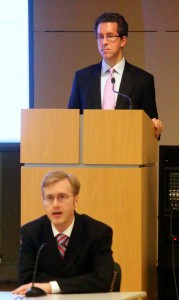Bob McGaw, pct. 1, said the language being used in this amendment does not conform with existing Planning Board language which could lead to legal challenges. The comments on this amendment revolve around how they don’t like the look of a side entry, not neighborly, not esthetic. But two residents asked if the Planning Board is asking for subjectivity on their amendments, why not with this independent amendment? “We need rules,” said Baptista.
The vote on the amendment. By 46 to 180, Dillon’s amendment is defeated.
Now discussion on Article 14. Christen McVay, Pct. 3, said the design review process is necessary to keep the character of the town.
Bryce Armstrong, pct 7, a renter of Grove Street, asked how this amendment will impact tax revenue in the town. Liz Allison, of the Planning Board, said if there is a family who has two children, unless they live in a house valued at $1.8 million, they do not bring in enough taxes to pay for the children in the schools.
Anthony Ferrante, pct. 8, said peeling paint, ugly vinyl siding and other issues have greater design “problems” then some of what the Planning Board is attempting to do.
Vincent Stanton, pct 1, did the research and of the nine tear downs to build of two families cost 30 percent higher so the issue that the two families are bringing in affordable units is false.
William Messanger, pct. 4, said this amendment is discriminatory as it only effects two-family homes and it will prevent the only method of affordable housing being introduced to Belmont. The home he lived in, circa 1895, could never be built today and that would have prevented him from coming to Belmont.
Mr. Mercier moved the question to great acclaim. “What a moment of surprise,” said Widmer to laughter.
It’s an electronic vote. Article 14 passes 206 to 16.
10:40 p.m.: Finally, the Minuteman High School Regional agreement, the new contract, is up and Bob McLaughlin is delivering it. Wouldn’t we all love to hear this article in detail, it’s going to be tabled (postpone) by Andy Rojas. Why vote on this when we don’t have enough information, said Rojas, and the town can wait. McLaughlin who helped write the agreement said even at its best, it’s only marginally better than the current agreement due to a great deal of compromise.
